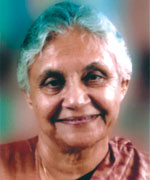|
The Delhi Government is relentless. It strives to excel in every sphere of governance. It isn’t, therefore, a matter of great wonder that in the last decade or so, the standards of living of citizens of Delhi have risen almost exponentially.
With better living standards and tastes, public awareness, especially regarding the necessity of education and literacy— primary to tertiary—is on the rise. Ever sensitive to the public mood, the Delhi Government headed admirably by Ms Sheila Dikshit has initiated several landmark measures to provide and facilitate convenient quality education to one and all.
|
 The results shown by Delhi Government schools have broken the myth that only pubic schools can deliver The results shown by Delhi Government schools have broken the myth that only pubic schools can deliver
—Ms. Sheila Dikshit, CM, Delhi
|
Among the foremost achievements of the Delhi Government has been by way of improving the reputation of state-run public schools compared to that of the elite, private ones. The Government has opened 98 new schools, renovated 141 existing ones to modern standards, besides bifurcating 23 others. Since 2005-2006, online admissions have been enabled for Municipal Corporation of Delhi run primary school graduates. Most importantly, the Delhi Government has opened 14 Pratibha Vikas Vidyalayas to impart quality higher education for proficient and deserving Government school students. This, mind you, is for starters !
EDUCATION FOR ALL
In 1990, International Literacy Year, some 1500 delegates from 155 countries as well as representatives from some 150 organisations agreed at the World Conference on Education for All in Jomtien, Thailand (March 5 - 9, 1990)—to universalise adequate basic education before the end of the decade.
The Delhi Government is living up to this universal resolution in letter and spirit and indeed with tremendous drive, dynamism and gusto. With this objective in mind, it began the Sarva Shiksha Abhiyan. Under the scheme, 1,04,000 children are estimated to have enrolled in 158 learning academies run by NGOs. During the last three years, more than 90,000 of these students have been formalised in mainstream schools. This has resulted in the construction of 350 additional classrooms over a very short time span, with 330 more under construction.
Also with the aim of ‘Education for All’, Yuva - an umbrella organisation - has been launched to tempt children from socially and economically weaker sections to join school and show them learning can be fun as well as educative.
Also, Vidyalaya Kalyan Samitis have been constituted in all Government schools to involve local community in the management of their neighbourhood school.
According to Chief Minister Ms Sheila Dikshit, “The results shown by Delhi Government schools have broken the myth that only pubic schools can deliver.” If one were to go by statistics, enrolment in Government schools recorded an all time high of 42 per cent from 800,000 in 1997-98 to 11,38,000 in 2006-07. Drop out rates fell from 42.2 per cent in 1998-99 to 5.9 per cent in 2006-07. Not only this, in order to fulfil the demands of a brave, new world order and society, schools are now resorting to new recruitment norms for teachers.
As a result of these measures, the number of students appearing for class 12 examinations increased from 38,033 in March, 1997 to 68,997 in March, 2007, and number of passouts from 24,131 to 57,051 and the pass percentage from 63.45 to 82.71 during the corresponding period.
PROGRESS IS SUCCESS!
The Delhi Government seems to be a firm believer in this adage. Consider computer education. This was introduced in 800 schools with 1,225 teachers being trained as master teachers and 13,000 as participant teachers.
Next, comes the CALTOON project. This aims at teaching subjects through animated multimedia interactive computer aided learning
programmes.
TECOS
Perhaps the most popular scheme launched by the Government is the Technical Education Community Outreach Scheme (TECOS). This comprises a public-private citizen partnership-based provision of training and technical education services to the poor and needy segments of society in Delhi.
Department of Training and Technical Education in the Delhi Government has hitherto focused on policy development, financing, planning and delivery of Training and Technical Education services. In order to fulfil the department’s obligations towards the poorest sections of society, a step is being taken in the direction of developing, maintaining and improving these services. TECOS would be a part of the overall scheme of Delhi Government’s efforts in engaging with the community through the Bhagidari-Sanjha Prayas initiative and otherwise. The purpose of the TECOS is therefore to enable the poorer sections of Delhi’s society to acquire effective livelihood skills.
INFRASTRUCTURE
Infrastructural upgradation is also in the Government’s priority list. The East Delhi Engineering College is being built at an estimated cost of Rs. 20.48 crore. Another, the Integrated Institute of Technology in Dwarka is also under construction at a cost of Rs. 20.40 crore. These state-of-the-art institutions are certain to further improve the quality of education in the Capital.
SYNOPSIS
One can, therefore, conclude that Delhi, as the capital of India, already offers a diverse range of educational opportunities be it in the field of humanities, technology, medicine or management. With the present Government’s emphasis on education and the intense drive to promote it, Delhi is well poised to emerge as a leading education centre of India, indeed a world class one at that.
Knowledge they say is power, and an empowered Delhi can only lead to an empowered India.
|